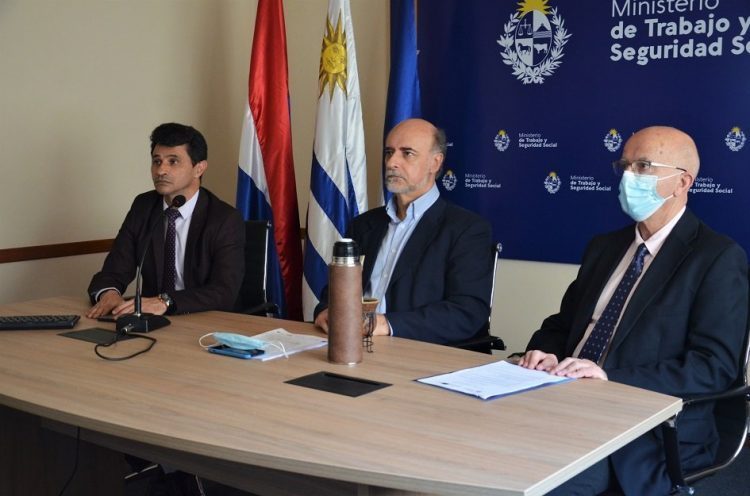Uruguay presented the Comprehensive Plan for the Promotion of Employment 2021-2024 and its evaluation and monitoring system in a social dialogue event with leaders from the business sector, trade unions, the social economy and cooperatives.

Photo: Opening: Daniel Pérez, National Director of Employment; Pablo Mieres, Minister of Labour and Social Security; and Mariano Berro, director of AUCI.
In the framework of EUROsociAL+ (Social Policy Area) support for the Ministry of Labour and Social Security of Uruguay, on 27 October 2021, the Comprehensive Plan for the Promotion of Employment was presented to business, trade union, social economy and cooperative leaders, as well as the ILO and CINTERFOR/ILO; key actors who were called upon from the beginning of the design process.
The Plan seeks to promote services to encourage employment in the most vulnerable population (young people, people over 45 years of age, people with disabilities), in their dual role as beneficiaries and strategic actors in the development of the country and territories.
Since February 2021, the EUROsociAL+ programme has been accompanying the National Employment Directorate (DINAE) in designing the Comprehensive Employment Promotion Plan and in constructing the employment market job search system of Uruguay. The design and preparation of the Employment Plan and its evaluation and monitoring system has drawn on an exchange with other public experiences from Europe (Germany, Spain and Italy) and Latin America (Argentina, Costa Rica and Colombia) that have furthered active employment policies in the COVID situation in view of the need to promote and rethink processes, policies and post-crisis programmes that facilitate access to options to contain and mitigate the consequences for the population, especially the most vulnerable sectors. Also in the middle of the year, a broad socialisation and validation exercise was carried out with the national institutions involved in the implementation of the PIPE.
The opening was attended by Pablo Mieres, Minister of Labour and Social Security, Mariano Berro, Director of AUCI, and Paolo Berizzi, Ambassador of the European Union in Uruguay. The latter mentioned that E+ collaborates with other European Union cooperation initiatives in Uruguay (Development in Transition) a project to integrate women into the ICT industries through mentoring and others with circular economy initiatives in the sawmill sector.
Below, referents from different sectors made their comments regarding the Plan: Gerhard Reinecke, Senior Employment Specialist at the ILO Southern Cone Office in Santiago; Pablo Darscht, Director General INEFOP; Julio Perdigon, director of INEFOP Workers Sector; José Pedro Derrégibus, Director INEFOP Business Sector; Alicia Maneiro, INEFOP Director for the INEFOP Social Economy and Martín Fernández, Chairman of INACOOP.
In his closing remarks, Francesco María Chiodi, EUROsociAL+ Programme coordinator of Social Policies, mentioned that the “so-called green transition is coming on very strongly -not only in Europe, shaking up balances or potentially putting economic, environmental and social objectives in conflict. But it is also coming with the potential to generate employment, because we are going to have to make energy more efficient, we have to reduce consumption, we have to produce new renewable energies, we have to decarbonise and, therefore, for example, to recycle and relocate workers and workers in industries with high levels of emissions.” Finally, he congratulated the country’s authorities and thanked the teams that worked on its design together with the EUROsociAL+ experts: Jaime Velilla, Fabio Boscherini, Marcelo Simonetta and Fabián Repetto.



